Polling shows the potentially ongoing impacts of Scott Morrison’s June announcement on AstraZeneca; for the vaccine rollout and for the country’s faith in their government.
AstraZeneca’s Bad PR…
AstraZeneca hasn’t had an easy roll out. Beginning with the best of intentions, the AstraZeneca vaccine is a venture to bring the most cost-effective vaccination roll-out to much of the world. Whilst it has been instrumental in containing the virus and continues as one of the most administered vaccines globally, it has not been without issues in Australia.
As one of only two available vaccines in Australia, AstraZeneca has experienced an increasingly bad PR situation in comparison to its teammate Pfizer. After hiccups in the trial and production phases, it’s first major set-back, the discovery of a rare but terrifying side-effect on younger recipients, sent the world into a spin.
The confusion surrounding the impact of this rare blood-clotting disorder began at a global level, with some nations stopping the use of the AstraZeneca vaccine entirely, some pausing its use pending further review, and some countries, such as Australia, declaring that this vaccine would only be given to age groups deemed at low risk by this side-effect.
It’s easy to question the decisions of our leaders in comparison to the decisions of other leaders given the exact same choice, and in Australia this has left Scott Morrison’s Government vulnerable to critique and controversy. Further contributing to the uncertainty has been the ever-changing advice of what age range is safe to receive this vaccine by the government and conflicting recommendations from the Prime Minister, State Premiers, State Health Chief Officers, ATAGI and the AMA. The announcement was made without clear communication to Premiers and General Practitioners around the country resulting in a disjointed message to the Australian public and varying state to state.
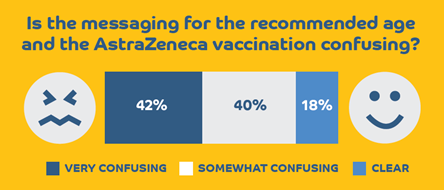
Our polling found that 42% of Australians found the messaging around AstraZeneca’s recommended age to be very confusing, and further 40% found it somewhat confusing. Not even those in medical fields are sure, with 82% of GPs also finding the AstraZeneca messaging confusing.
Confusion the AstraZeneca Vaccine Did Not Need
On June 28, Prime Minister Scott Morrison announced that those aged between 18 – 60 could discuss receiving the AstraZeneca vaccination with their GP, a suggestion that at the time contradicted the Australian Medical Association’s advice.
This caused mass confusion, with 66% of Aussies from this age range stating in the days after that they were not confident in this advice from the PM. For a product that is contentious in nature by being firstly a vaccine, secondly a covid vaccine, and thirdly having a concerning potential side-effect, what AstraZeneca did not need was a further push down the conspiratorial path by the Prime Minister.
The public reaction to this announcement was undoubtedly detrimental to overall faith in the government, with 42% of the population reporting it made them feel distrustful towards the government. Sentiment like this fosters an uncertainty that can play out in extreme action, such as last week’s anti-lockdown protests in Sydney and Melbourne.
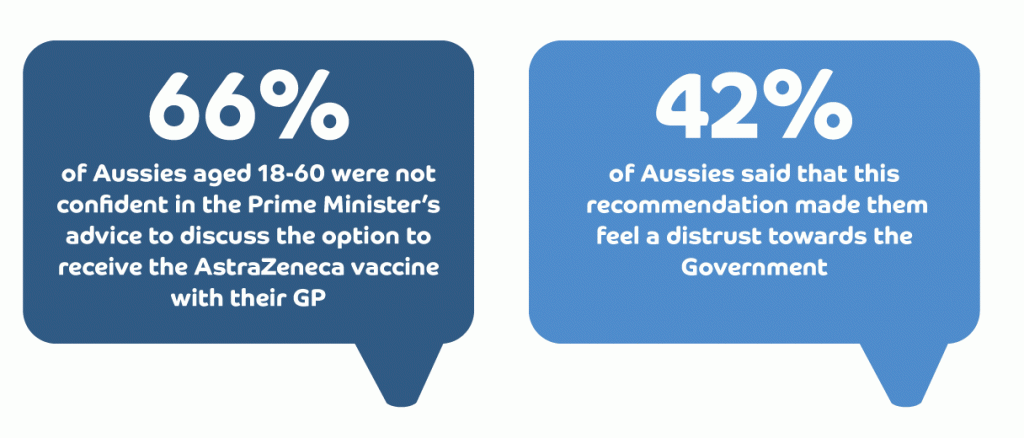
What if the PM Had Been on the Same Page as Medical Advisory Groups?
Things are constantly changing in the AstraZeneca game in Australia, with ATAGI (the Australian Technical Advisory Group on Immunisation) announcing over the weekend that they advise all adult Sydney residents to consider AstraZeneca, given that the risk of catching Covid are now heavily increased for this group. Given the state of the current situation, and the backing by a medical body, there has far less criticism on this advice, the very same advice that created such controversy for the PM.
At the time of the PM’s initial suggestion for 18–60 year old’s to consider the AstraZeneca vaccine, 61% of Aussies in this age group said they would not be following his advice and a further 35% said they were unsure on what is best to do. This left only 4% of the population of this age group who considered Scott Morrison’s advice viable, which highlights the irrationality of his decision to provide such a suggestion without any medical backing.
Perhaps getting on the same page strategy-wise, with medical authorities would have been a better use of Scott Morrison’s efforts in the last week of June. Providing a united front and following medical recommendations undoubtedly would have avoided the extent of confusion and backlash to the announcement that still reverberates in today’s conversation on whether Sydneysiders should get the AstraZeneca vaccine. The knock-on effect of the distrust in Scott Morrison’s advice and the call on ATAGI and the AMA to follow political recommendations by the Prime Minister himself gives way to uncertainty in todays recommendations from the AMA.
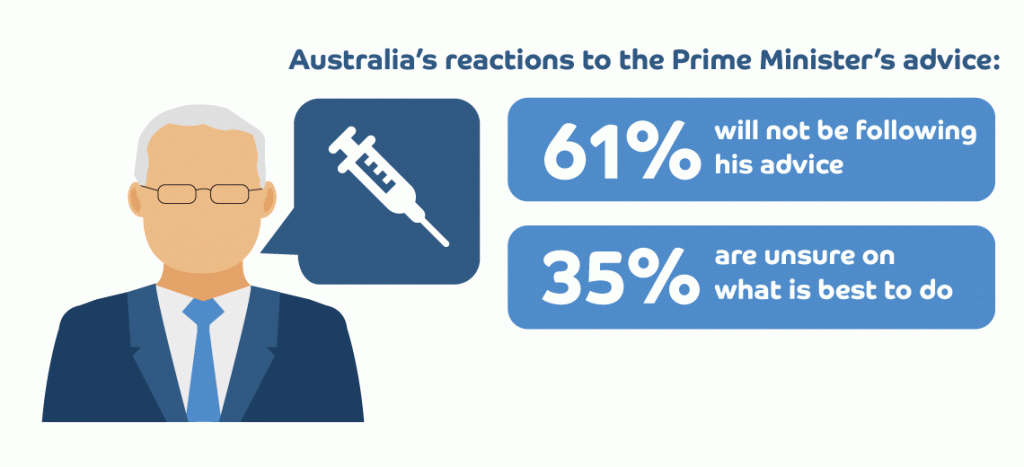
We found that 8 out of 10 Australians believed the PM should not have issued his suggestion given it went against medical advice, and directly after his announcement 85% of Aussies in this age range stated that they would NOT be taking the AstraZeneca vaccination, even if it were available to them.

The Ripple Effect of the PM’s Well-Meaning Advice
This announcement from our country’s leader was likely delivered with good-intention, but not only could it have caused a detrimental effect to the roll-out, it could also impact the efficacy of future health advice from the government. After the announcement, at least half of the population felt concerned that the government was putting the economy above the public’s health (50%) and 62% stated they thought that the PM’s suggestion being at odds with official medical advice was creating a risk to Australians.
When Scott Morrison went against medical advice he also made 64% of the general public feel concerned about the state and federal government not being aligned when it comes to the vaccine roll-out, which has since been further heightened by the back-and-forth criticism the states are throwing at each other. Around 45% of Aussies said that the PM’s recommendation alone has negatively impacted their likelihood to vote for Scott Morrison’s Liberal government in the next election.
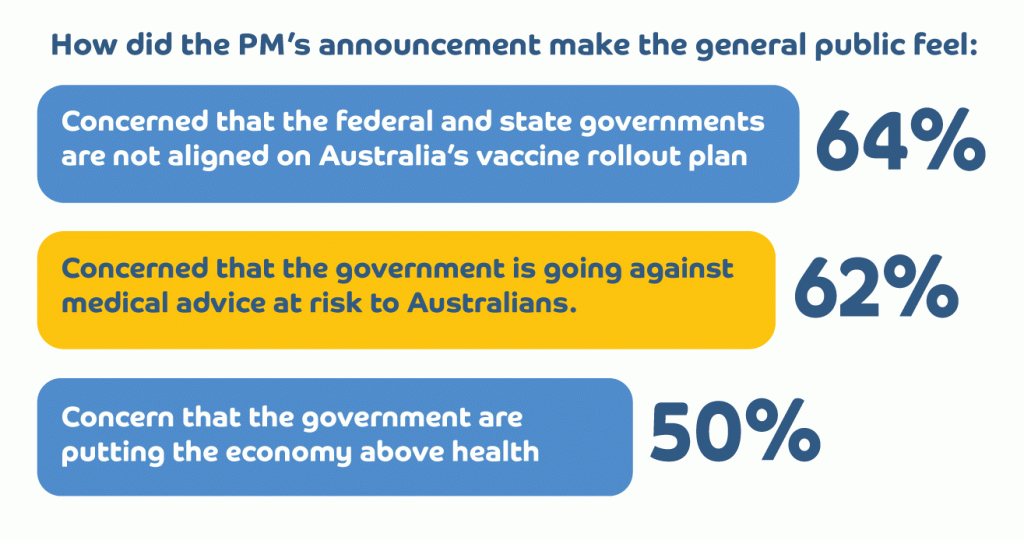
The Indemnity Doesn’t Cover GP’s Moral Predicament
A major aspect of the advice for 18-60 year old’s to get the AstraZeneca vaccine was to first discuss this with their GP. Further highlighting the futility of the PM’s initial announcement, is the fact that we found 64% of GPs to be unlikely to recommend the AstraZeneca vaccine to patients under the age of 40. Even with the indemnity promised by the government, 4 out of 10 GPs felt uncomfortable to issue the vaccine to Aussies aged 18-60 years old.
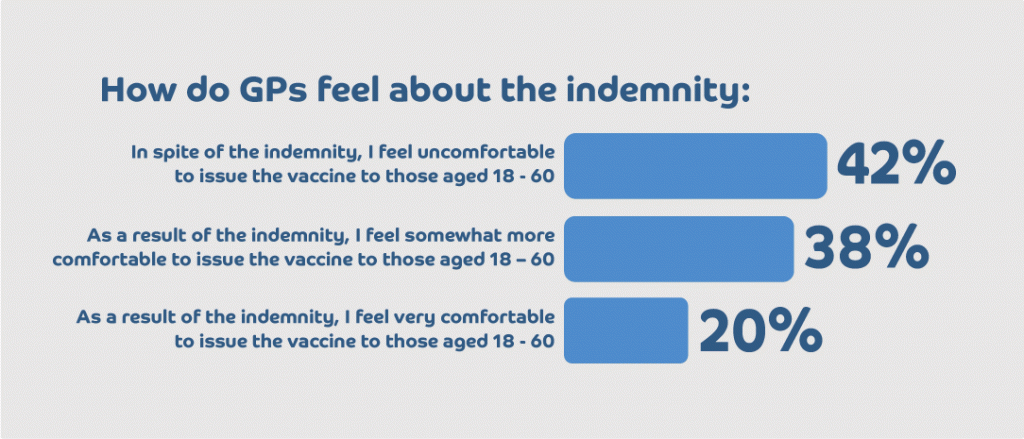
Having to make a doctor’s appointment to discuss a vaccine that their GP might not even recommend might put-off the task for some Australians, and so pharmacy’s offering the vaccine would potentially speed-up the vaccine roll-out. We surveyed 377 Australian pharmacists, the majority of whom already administer vaccinations (62%), and 58% stated that they believe pharmacists could also be having the conversation with patients to advise the administering of the AstraZeneca vaccine.
However, whilst they might be willing to absorb some of the workload from GPs, patients could find a similarly low level of endorsement from their pharmacist. Just as GPs were not keen in recommending their patients get AstraZeneca, 7 out of 10 of Australian pharmacists also stated they would also not feel comfortable in giving the AstraZeneca vaccination to Australians aged 18-40.
A Decision To Be Made
With the ever-changing landscape of the current Covid situation and Sydney’s numbers continuing to climb despite the current lockdown measures in place, is it time for Australians to make a decision on the AstraZeneca Vaccine?
Although, the Prime Ministers pre-emptive advice to start a conversation and get vaccinated caused mass confusion, from State Premiers to the GP’s set to be administering and for everyday Australian’s, the change in advice from ATAGI and the AMA amidst the changing Covid landscape might be cause for consideration. Each individual needs to consider and weigh up the risk and benefit that the AstraZeneca vaccine offers and weigh it against the increasing risk, especially in Sydney. Ultimately it will be up to the individual and the key to converting those sitting on the bench is consistent messaging from the top down.
Ekas spoke to over 300 Pharmacists and 300 General Practitioners on it’s panel Medical Opinion Leaders in June 2021 and over 1300 Australian’s on it’s panel Select Opinion Leaders in June 2021
